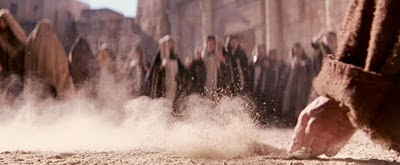

The Conversations (at Slant.com) is a monthly feature in which Jason Bellamy and Ed Howard discuss a wide range of cinematic subjects. This month, an extended, detailed and really substantial consideration of two Jesus movies...
Jason Bellamy: I never followed the amateur filmmaking documentary series Project Greenlight, which was perhaps best known for having celebrity producers (Matt Damon and Ben Affleck) and for failing to discover any major breakthrough talents, but I'll never forget one of the episodes I happened to see. It was early in its third and final season, by which point Project Greenlight had expanded its diamond-in-the-rough search to be a contest not just for amateur screenwriters, but also amateur directors. In the episode in question I took delight in the method chosen to evaluate their pool of director nominees: All contestants were given identical screenplays offering nothing more than dialogue. No descriptions of settings. No descriptions of characters. No descriptions of action. Just words to be spoken. From that skeleton it was on the directors to dream up the rest, fill in the blanks and shoot a film. All these years later, I can't remember anything about the dialogue, but I do remember that the interpretations were wildly diverse—one had a mob theme while another was set in a dentist's office, as I recall. Same source material. Same words. Different films.The conversation continues here
That brings us to this month's edition of The Conversations, in which we will discuss Martin Scorsese's The Last Temptation of Christ and Mel Gibson's The Passion of the Christ, a pair of films that are remarkably and unmistakably different despite the numerous things they have in common. . . . When it comes to the life of Jesus, so much of the Bible is like those Project Greenlight scripts: dialogue on a page. No descriptions of settings. No descriptions of characters. No descriptions of action. Just words to be spoken.
. . .
It's only fitting that a devout worshiper of cinema such as Scorsese would use film not just as a way to reveal his own feelings about Christianity but as a way to explore them. And, as such, Last Temptation feels like two quests—that of Jesus Christ and that of Martin Scorsese.
And yet the more I continue along these lines of thinking, the less dismissive I become about the substantiality of THE PASSION. Is the film as complex? No. Is it as provocative? No. Is it as conflicted? Heavens, no. But is it personal? Well, I think so, yes. And is it "engaged with matters of spirituality?" Why, certainly. . . .


No comments:
Post a Comment